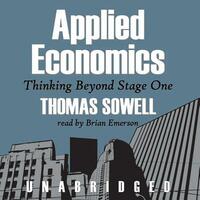Take a photo of a barcode or cover
informative
reflective
medium-paced
I could read this over and over again. It is just amazing.
Not as dry as an academic text, not as curmudgeonly as some of his polemic stuff, and not as flashy as freakonomics, but pretty good for being free on audible. Here, Sowell is just applying his (old-school conservative) economic ideas to some current issues, seeing how economics can cause surprising policy outcomes or alter the course of history. It's quite good to be able to weigh nice, Liberal policies against what (in his opinion) their unintended consequences will be.
I've read some of Sowell's other books and in some he does a good job of putting across libertarian and old style liberal ideas. The objective here is the same but it is far more outlandishly partisan than other work I've read. The descriptions (take the health chapter for example) are so one-sided they are laughable.
Sadly this undermines his argument significantly and it makes for agonizing reading. This is not a useful contribution to the debate.
Lastly, the title makes this sounds like a textbook: it really isn't...
Sadly this undermines his argument significantly and it makes for agonizing reading. This is not a useful contribution to the debate.
Lastly, the title makes this sounds like a textbook: it really isn't...
This volume examines the economics of free and unfree labor, medical care, housing, immigration, discrimination, and the development of nations. It repeats a bit of material found in some of Thomas Sowell’s other books. Sowell is an insightful thinker and writer on issues of economics, sociology, and politics, but I think he has a tendency to make ten books out of five books worth of material. This was not as interesting a read, overall, as Basic Economics, but it still gave me food for thought and provided perspective on economic issues that are often too facilely explained. I found the chapters on “Politics vs. Economics” and "The Economics of Discrimination" to be most interesting.
Sowell has a refreshing tendency to looks at the effects of economic policies regardless of party, critiquing policies of both Democrats and Republicans, and concerning himself more with actual outcomes than intended goals. He also notes that many of the Democrat policies that Republicans associate with long-term economic damage are actually policies that were begun under Republicans and only continued or expanded under Democrats, such as Nixon’s oil price controls (continued under Ford and Carter and not lifted until Reagan) and Hoover’s interventionist economics (expanded under FDR’s “new deal.”).
Sowell has a refreshing tendency to looks at the effects of economic policies regardless of party, critiquing policies of both Democrats and Republicans, and concerning himself more with actual outcomes than intended goals. He also notes that many of the Democrat policies that Republicans associate with long-term economic damage are actually policies that were begun under Republicans and only continued or expanded under Democrats, such as Nixon’s oil price controls (continued under Ford and Carter and not lifted until Reagan) and Hoover’s interventionist economics (expanded under FDR’s “new deal.”).
: "Applied Economics" as the title makes sense but perhaps not as some or many anticipated. More than a book about economics and the economy, Sowell's books is about the application of economic thinking to issues and problems in re: human behavior individually and collectively. It's about casting the empirical eye over the intuitive/emotional eye. Many call Sowell's perspective "scientific thinking" rather than "economic thinking", but that's a matter of semantic preference. All that said, Sowell's presentation of issues and observations is generally quite balanced, though he tends to leave more than a few matters up for discussion and not addressed, and some of those matters are genuinely consequential and kind of glaring by their absence. However, there's no shortage of food for thought provided, and it's a worthy read regardless of which way your political vane points.
informative
This book forcefully fulfills its goal of showing that most of the fallacious economic arguments put forth by politicians, the media, and issue groups can be debunked simply by thinking beyond the immediate effects upon a single group.
Sowell has exactly what you'd expect. Nuanced perspectives and criticism of supposed statistics policies and ideas in vogue. The sections on insurance, "general immigration", and geographical limitations of developing nations were particularly interesting. It's a great resource for anyone looking for hard math to back up suggestions on economic policy. This book has taught me to think beyond the initial response to economic changes.
Straight up common sense - highly recommend all around. I look forward to reading more of his books (he only has about a thousand)
I took a ton of notes, but I don’t feel like transcribing all of them. Key takeaways - always think beyond stage one. It’s not just what will happen next. It’s what happens after that and after that and so forth
Four things happen following a price control:
1) increased use of the product
2) reduced supply
3) quality deterioration
4) black markets
So well done - covering healthcare, economics, discrimination, etc etc
I took a ton of notes, but I don’t feel like transcribing all of them. Key takeaways - always think beyond stage one. It’s not just what will happen next. It’s what happens after that and after that and so forth
Four things happen following a price control:
1) increased use of the product
2) reduced supply
3) quality deterioration
4) black markets
So well done - covering healthcare, economics, discrimination, etc etc

